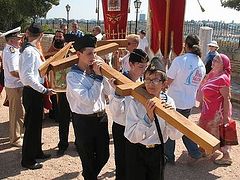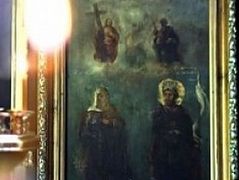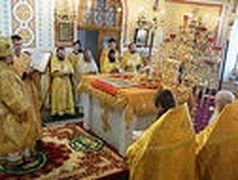At the November 14, 2010 commemoration in Sevastopol on of ninety years since the departure of the Russian army and emigration from the Crimea, the TV channel Russia 1 came to the event to interview participants from the Russian Orthodox Church Abroad and the Patriarchal cultural council. We present below in English translation portions of these interviews, which provide insightful looks at the hopeful of events today, and the tragic events of the past now being remembered.
Archimandrite Tikhon (Shevkunov), Superior of the Moscow Sretensky Monastery, and Secretary of the Patriarchal Culture Council.
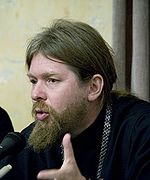
The tragedy of departure was also the tragedy of the division of the Russian nation. Could we speak now about a symbolic reunification, ninety years later?
Several years ago, there occurred an event of major importance—the reunification of the Russian Orthodox Church and the Russian Orthodox Church Abroad. This was an extremely important event, although many do not yet fully understand it. There was a bloody civil war, a bloody division, when brother literally "rose against brother, and son against father." These are Christ's prophetic words about the most terrible and mindless times in human history. These prophecies came true in Russia, ninety years ago. It seemed impossible to heal these wounds—then. But time passed, and we see that even those people who participated in those events and their descendants have recognized also the general falsity that they all had, and that truth which each one tried to uphold. Time makes people and nations wiser. Therefore, that unification was the most treasured and sacred thing there is for faithful Christians. That is, the unification in the Eucharist, in the Church, in the Liturgy. This is the greatest sign that Russia is ready for peace within itself. "Peace be unto all," says the Church in its services. This peace can be simply proclaimed, or it can be felt. There are divisions enough even in our country these days—some very unjust and painful. The Church does not say that we must pay no attention to any of it, no matter how unjust, and be united. That would be nonsense. The Church says that if people call themselves compatriots, especially if they call themselves co-religionists, and especially if they truly cherish their homeland, they should do anything they can to achieve that longed for and exceedingly important unity, because it is needed, and history tells us this. Unity is definitely needed. If this does not happen, then it will not be "peace unto all," but "woe unto all." And we will all be answerable.

My father, Arkady Timofeevich, was born in Belgorod, to a military family. He was born in 1900. He studied in the cadet corps, and at age sixteen (he hid his real age) he went to the front with the other cadets, and was wounded. When the civil war began, he became an officer of the White Army, and staff officer to General Wrangle. He was wounded a second time, and went with General Wrangle to the Crimea, when the last of the Russian White Army was preparing for evacuation at the advance of the Red Army. Thus, my father was one of those who departed from this place, ninety years ago.
I think that my parents, especially my father, passed on to me the awareness of the whole tragedy of the Russian nation, who lost practically everything. By the 1920's, the emigration knew well what was happening in Russia. They knew of the mass murders of priests, the desecration and destruction of churches. They abandoned their homeland, not knowing how it would all end. But they left their country with firm hope and faith in Russia's rebirth. They departed from Sevastopol defeated, but not crushed. This love for Russia, this loyalty to the Russian idea, was preserved in them, and they passed it on to the next generation. They lived in the hope that the white, blue and red flag would be raised again, the two-headed eagle would shine in glory, and the churches would be restored. I lived to see this happen.
Of course, it is a long process. But this hope is what kept us going during those difficult years of emigration. Sometimes the Russian people in Russia imagine that the emigrants lived in wealth after they left, and that they were traitors. But they lived in very difficult circumstances. In Paris, nearly all the taxi drivers were former Russian officers, and it was very hard to get by.
The emigrants' idea about people raised in the Soviet Union also contained much error. All of prejudices need to be done away with. We ran up against this during the ecclesiastical reunification process. We saw that at times during the discussions, it became clear that we simply did not understand each other. But with events like this, we can mark for the first time such dates as the White Army's departure from Russia, and see them not as traitors, or white bandits, but as heroes, who were ready to give their lives for the faith, Tsar, and fatherland. This gives us a chance to come together as compatriots, and not as enemies.
For me it is very touching to the point of tears be able to see the place where my father saw Russia for the last time, not knowing if he would ever return, or what awaited him in emigration. It is hard to imagine what a difficult moment this was for all those who had made such efforts to restore Russia during those years.
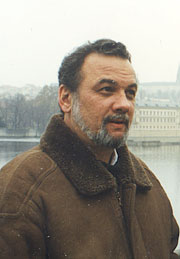
The departure of the Russian emigrants was a tragic moment in the history of Russia, mainly because it meant the defeat of those forces who tried to save Russia from the catastrophe that soon did happen. As a result of this tragedy, the Russian people were divided for the first time in history, and both sides experienced great hardships. Both sides manifested that spiritual gene, in that they demonstrated throughout those decades the triumph of the Russian spirit. Those who were in exile said of themselves, in the words of Bunin, "we are not exiles, but emissaries." That is, they felt that they were missionaries bringing this Russian idea, which Dostoevsky described as "the universality of the Russian soul." The Russian people who found themselves in the emigration contributed much to the sciences, the arts; they were a fresh stream flowing into those countries where they ended up. The other part found themselves in Russia under the press of a terrible, militant anti-theistic regime. Nevertheless, these people worked a miracle—there were no cadres left in Russia, yet suddenly, in the course of some fifteen years, a whole host of master craftsmen, scholars, technicians, and engineers arose to create a practically new country. They were squeezed, they were pressed, but they went forward to victory in the war, and flew to outer space. It was all the work of their hands, their genius.
Now these people's descendants are meeting, and the hope is rising that civil peace can be finally restored; it is our duty to reunite, to forget that nightmare of separation. To unite, and continue building the country, which should, by its destiny, be a great country. Now, today's Russia is rendering honor to those people who departed from Sevastopol, who fulfilled their duty to the end. They are doing the work given to Russia as a great and powerful state, inspired to bring truth to the world. It is the light of the truth of Christ, for Russia has been an Orthodox country from of old.
We know who was right and who was wrong—history shows it even more accurately. But our duty is not in this. We must unite in order to resist those threats to Russia both internal and external as she rises from the ashes. Those destructive processes of the twentieth century are not so easy to stop, and it will take tremendous effort. Russia has always walked its own path, and her departure from this path has ended in catastrophe.

Well, I want this to be a lesson. I think that it is more important today than ever before. For, if the age-old traditions of Russia were saved somewhere, it was with this very emigration, which was forced to leave the country, and which managed, without having their homeland, to exist in the name—and only in the name—of this homeland and their remembrance of it. Take any of the literature of Bunin, Shmelov, Zaitsev, or the great poet Turoverov. Everything that they wrote about Russia is penetrated with such a feeling of Russia, which I believe they would not have experienced if they were here. As they say, we don't appreciate what we have, but we cry when we've lost it. On the other hand, I think that, unfortunately, we do not learn. We very often step on the same rake. We can't seem to learn that the wavering of minds not firm in anything, as Griboyedov said, is a ruinous path for Russia. Ruinous. This wavering of minds not firm in anything, and the manipulation of these minds, is what led to that terrible blood-letting, that insanely cruel civil war. It seems to me that we should have learned a lesson from this: who profits when Russians fight with each other?
You know, peace has been made, but not repentance. Peace-making without repentance does not work very well in this situation, as I see it…
This enormous nation fell for a temptation, a huge temptation—the temptation of unbelief, faithlessness, anarchy, the trampling of all ethical norms, religious norms, and family. They tempted us: Do what you want. Blow up the churches, bury priests alive. Anything. Freedom. If you look at it this way, then you have to admit that repentance is needed. After all, the churches were blown up not by alien beings, or by imperialists, or someone else. They were blown up by our own people. Why did this happen? For what? I think that this punishment came, to a great degree,for the very temptation to do it.
The army left to places like Bisert or Lemnos, where there were Cossack camps; people were stuck in the ports for several months, and there were outbreaks of disease, typhoid, tuberculosis. Little children died, and they were taken off the boats, but their parents were not allowed to disembark. They did not even let the parents bury their children… Nevertheless, these people preserved their dignity. They rose from their knees, and built their tent churches. They started working. Even the French began going to them to have their shoes mended…
I believe that any reform in Russia should be understandable to the Russians. The Russian only understands what touches his inner sense, his perception of the world. Even if he is degraded, drunk, alcoholic, it doesn't matter—you can grab him by the lapel, by the tie, or by his ear, look him in the eye; and if you talk to him on the level you will see if he understands what's being said to him. But we don't do this. Therefore, only those people are multiplying who we don't know, and we have nothing to say to them anyway.
Count Sergei Alexeyevich Kapnist, from Paris
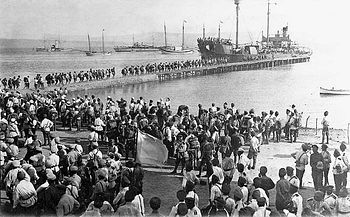
They ended up in emigration. My grandfather was in the Duma when they left, while my mother's family left under less complicated circumstances, since her grandfather was the rector of the church in the Russian consulate in Paris, the Alexander Nevsky Cathedral.
But for my grandfather, there were historical events. His family members were being executed in various places in Russia, and naturally this was the only way out.
This date is a symbolic moment, which underlines the whole horror of the period. What happened must be remembered, so that it would not be repeated. We just have to look at the facts… it was horrible, many people perished. This was a genocide of the Russian elite, to a certain degree—I do not only mean this exile, but the whole revolutionary period and the Bolsheviks' accession to power. So, we have no right to erase this history. Pictures were purged from books during the communist period of Russian history, and this should not be done, because the future generations will forget about it. Then there is a risk of it recurring. But the memory should be preserved, even if it is unpleasant.
It seems to me that this is the first time we have been able really talk about this together. Not everyone agrees with all the conclusions, but at least a step forward has been made, a very important step. I am convinced that the time will come when it will all come clear, and we will be able to say that this happened with God's help.
Do any of the descendants of the first wave of emigrants still hold a grudge against Russia? You know, there are some people who still look at Russia with some doubt, as if they are waiting for some ideal changes to occur. I consider that we should not think that way, but rather just participate in what is happening in the country, offer our widow's mite, so that we can have the feeling, as I said at first, that we are serving Russia.
I think that if Russian society accepts it and feels that there is something beneficial in this, then we should serve this way. It is not for us to decide, of course, because we have our own convictions, our own history, and our lives are more or less established. But if we can find a way to serve Russia, then I think that many will agree to it and not refuse it.
Have those who left in the '20s forgiven Russia? I don't know, they died before I was born, so I can't name an example. But I think that the majority of people have actually made peace with this idea, in that many of us have personal contacts on the family and business level that were not bound up with political, communists circles. We felt Russia, the depth of Russia… We knew them (communists), we renounced them, but that is not the most important thing. And now our children, our grandchildren are fortunate to live in a period when they can freely study and work in Russia, and continue that path. They even see greater prospects in Russia than in the West.
How much of Russian culture was preserved? I think that it was preserved through the Church, certainly, because there were schools, camps… which helped the families pass on the Russian spirit. What is amazing is that there are Russian families in which the language and even the strength of faith were lost. But we notice that even though the second and third generation parents may not speak Russian, their children are drawn to Russia.

